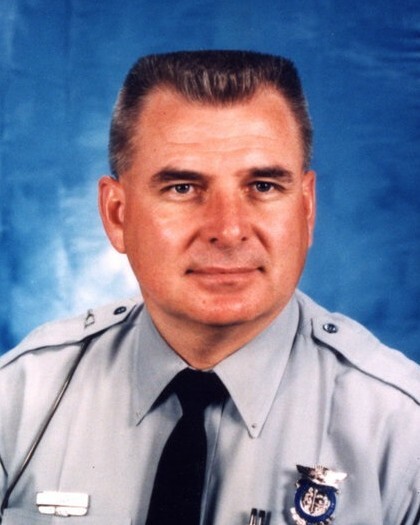- On the 25th anniversary of the officers' murders, Lowry's brother objects to ads while they fight to keep Beasley's clients behind bars.
- “We’ve been fighting it 25 years and thought it was over when they got the death penalty. It’s like a dripping faucet. It never stops,” said Lowry.
Tilmon and Kevin Golphin were troubled teenage brothers from near Richmond, Virginia, who ended an interstate crime spree by shooting and killing two officers in Cumberland County, North Carolina, on Sept. 23, 1997.
Now, 25 years later, the deaths of N.C. State Trooper Ed Lowry and Cumberland County Sheriff’s Deputy David Hathcock are again a topic of conversation as one of the key defense attorneys in the case, Cheri Beasley, is running for U.S. Senate.
On that September day, Tilmon, 19; and Kevin, 17; entered Financial Lenders in Kingstree, South Carolina, wearing masks and armed with a Soviet military rifle believed to be stolen from their grandfather, according to the Fayetteville Observer. They forced the two female employees into the bathroom and made them face the wall. The women heard the clicking of the rifle around half a dozen times but no shots were fired. Afterwards, the brothers left with a number of items, including one employee’s green Toyota Camry.
South Carolina police put out a “BOLO,” or “be-on-the-lookout” order, for the brothers and the green Camry. Two hours later, when Lowry pulled the Golphins over on I-95 in Fayetteville, he did not know about the BOLO. He simply noticed the driver wasn’t wearing his seatbelt.
Before he was aware the car was stolen, Lowry allowed Kevin, the driver, to come back and sit in the passenger seat of the cruiser with him while he wrote the ticket. But when they ran the plates and learned about the BOLO and the fact that the car was stolen, the situation escalated quickly. Lowry called for backup, and without any other state troopers available, Cumberland County Deputy David Hathcock arrived soon after.

N.C. Highway Patrol
Lowry drew his weapon and attempted to secure Kevin while directing Hathcock to secure Tilmon, but Kevin began to struggle with Lowry. Tilmon exited the Camry and walked back to where his brother was struggling. After the officers pepper sprayed Kevin, Tilmon ran back to get his rifle and began firing at both officers, first Hathcock then Lowry. Both were struck multiple times. With Lowry moaning on the ground, Kevin then armed himself with Lowry’s pistol and shot Lowry at least three times before shooting Hathcock as well.
The brothers were later arrested, charged with the killings, and given the death penalty. The death penalties were later changed to life without parole for both brothers — in one case because the U.S. Supreme Court ruled nobody under 18 can be put to death, and in the other case because of the state’s Racial Justice Act, which largely eliminated the death penalty in North Carolina.
During the trial, Beasley became the face of their defense to some in the victims’ families. And seeing her all these years later during her run for U.S. Senate being portrayed as a friend of law enforcement is not sitting well. Al Lowry, Ed’s brother, spoke with Carolina Journal on Sept. 22, saying every time he sees an ad for her U.S. Senate campaign, he said he wants to “jump through the screen,” adding, “It makes me sick every time I look at her because I know she’s not the right person for the job.”
“I just think it’s B.S,” Lowry said of ads portraying her as pro law enforcement. “She’s for the criminals and not for the law officers, which my brother was one of them that got killed… The ad says law enforcement stands behind her. I don’t believe that for one second. People just don’t understand what she stood for 25 years ago, and people don’t change their attitude.”
The families have not been able to put the slayings behind them easily, as they have had to frequently return to court after appeals and updates.
“Both of them got the death penalty, but it seems like the law changes about every other week, then we’re back to court, back to court, back to court,” Lowry said. “So 25 years later, we just got out of the courtroom two months ago because Kevin was trying to get out on parole.”
While Kevin Golphin lost his case to be allowed parole, Lowry said he “can’t say never” on the brothers one day being released because “we’ve been fighting it 25 years and thought it was over when they got the death penalty. It’s like a dripping faucet. It never stops.”
In addition to the impact of the never-ending court drama, Lowry said the loss of his brother’s presence has been a major blow to all those in his life.
“It was devastating,” Lowry said. “My mother, she was on her deathbed the day my brother got killed. So it’s been a long journey.”
Lowry said that Ed’s daughters are now doing well — with one being a dental hygienist and the other working in medicine. But it was not easy on them.
“Both his daughters are doing well, and the families are doing well, and the grandkids are doing well,” Lowry said. “But I guess [being with his family] is just one of those things that he’ll never get to enjoy.”
For some activists on the left, however, the Golphin brothers’ case is an example of a racist system targeting young black men. Cameron Bynum, who has worked for ACLU North Carolina and Common Cause North Carolina, wrote and performed a poem entitled “For Tilmon.” In the poem, she said the brothers were “pulled over in Klan County, North Carolina” and that Tilmon “saved his brother” by shooting the officers because he was just “scared for his brother, scared for himself.”